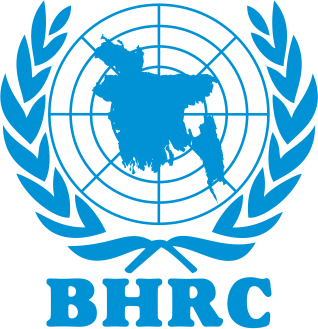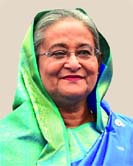

|
EDITOR
|
Editorial
‘Fortnightly’
পাক্ষিক |
|
|
Swiss president announces $12.9 million in aid for Rohingyas during Bangladesh visit

Human Rights Report
Switzerland
will give an additional aid of 12 million francs
($12.9 million) for the Rohingyas, who fled to
Bangladesh facing persecution in Western Rakhine
state.
Swiss President Alain Berset, who is now in Dhaka on
an official visit, made the announcement on Monday
after official talks with Bangladesh Prime Minister
Sheikh Hasina.
In a joint statement, he pledged his country's full
support to Bangladesh on the issue.
The aid comes on top 8 million francs ($8.6 million)
the country gave last year for the hundreds of
thousands of refugees in southeastern Bangladesh
district of Cox's Bazar.
There are now more than 900,000 Rohingyass in the
country after nearly 700,000 fled violence in
Myanmar that flared up in late August.
During the joint press briefing after the official
talks on Monday, Bangladesh Prime Minister Hasina
said that the root of the crisis lies in Myanmar and
the solution has to be found there.
Describing the talks with meeting with Berset on
Rohingyas as "productive," she said that Bangladesh
emphasises on immediate implementation of
recommendations made by the Kofi Annan panel.
.
Total 184 persons killed in February, 2018
Human Rights Report:
The documentation section of
Bangladesh Human Rights Commission (BHRC) and
International Human Rights CommissionIHRC jointly
furnished this human rights survey report on the
basis of daily newspapers and information received
from its district, subdistrict and municipal
branches. As per survey it appears that 184 peoples
were killed in February, 2018 in all over the
country. It proves that the law and order situation
is not satisfactory. Bangladesh Human Rights
Commissions extremely anxious about this situation.
In the month of February, 2018 average 6.5 people
were killed in each day.
The Law enforcing agencies and related Govt.
departments should be more responsible so that
percentage of killing February be brought down to
zero level. To institutionalize the democracy and to
build human rights based society the rule of law and
order must be established everywhere. Through
enforcing rule of law only such violation against
human rights can be minimized.
It appears from documentation division of BHRC:
Total 184 people's killed in February 2018
Killing for dowry 5, killing by family violence 33,
Killed due to social discrepancy 58, Political
killing 7, Killed by Law enforcing authority 11,
Killed due to BSF 2, Killed due to doctor negligence
4, Kill due to abduction 5, Assassination 9,
Mysterious death 41, Women & Chilled killed due to
rape 9
Killed by several accidents:
Killed by road accident 275, Suicide 31
Besides victims of torture:
Rape 37, Torture for Dowry 6, Sexual Harassment 9.
3 female Nobel
laureates to Suu Kyi: Wake up or face prosecution
Human Rights Report:
Three visiting female Nobel laureates made the
demand at a Press Conference in a city hotel on
Wednesday called on the fellow laureate Suu Kyi and
Myanmar military to put an end to killings and the
prosecution of the Rohingya people.
The three female Nobel Peace laureates--Tawakkol
Karman, Shirin Ebadi and Mairead Maguire - on
Wednesday called upon Myanmar's leader Aung San Suu
Kyi for an immediate end to the "genocide" of the
Rohingya people.
"If she fails to do so, her choice is clear; resign
or be held accountable, along with the army
commanders for the crimes committed," said Tawakkol
Karman.
Karman said this when the three Nobel laureates were
addressing a press conference in a city hotel in
Dhaka with the conclusion of their visit to
Bangladesh on the six-month anniversary of the
current Rohingya crisis that forced millions to flee
into Bangladesh from Rakhine State of Myanmar.
"She (Suu Kyi) must stop turning a deaf ear to the
persecution of the Rohingya or risk facing trial,"
Karman said.
The three Nobel laureates urged Suu Kyi to speak out
about violence against the Rohingyas, often dubbed
one of the most persecuted minorities in the world.
The laureates are calling on Suu Kyi and the Myanmar
military to put an end to the killings and the
persecution of the Rohingya people.
As the trio committed to peace, the laureates are
urging Aung San Suu Kyi to exercise her personal and
moral responsibility to stop the "genocide".
The Nobel laureates came to Bangladesh on Saturday
and began a visit to the Rohingya camps to assess
the allegations of violence against Rohingya women
and the overall refugee situation.
The Nobel Women's Initiative, a platform of six
female peace laureates established in 2006,
organised the visit in partnership with Naripokkho.
On Sunday, they visited the refugee camps in
Kutupalang and Balukhali..
US expects fair polls in BD: Bernicat
Human Rights Report:
Mentioning that they have no favourite party and
political personality in Bangladesh, US Ambassador
in Dhaka Marcia Bernicat on Wednesday said they just
expect fair polls here.
"We hope to see election is fairly run and run well.
We like other embassies are meeting different
political parties, mainly major two parties, to
better understand the election condition here," she
said.
Bernicat further said, "The US government has no
favoured party and it has no favoured political
personality in Bangladesh. Who is elected to lead
the government is the choice and the only entity of
Bangladeshi people."
She was talking to reporters after attending a civil
rights panel discussion session at the EMK Center in
the city's Dhanmondi area.
The public affairs section of the US Embassy in
Dhaka and the EMK Center jointly organised the
programme.
Noting that what they care about is the process, the
US envoy said, "We both are democratic parties. We
have democratic rules and the fundamental basic of
democracy is people who have the right to choose and
change their government. So for us, it's a matter of
process. If the process is truly representative and
fair, then you have the basis for stability."
The
Marma Sisters are Our Girls Too
Human Rights Report:
The series of extraordinary events that culminated
on February 15 with the dramatic discharge, under a
court order, of two sisters belonging to the Marma
community from the Rangamati General Hospital,
serves to demonstrate just why the peace prevailing
in the Chittagong Hill Tracts is such an uneasy one.
As long as the state continues to rely on a heavy
military presence in those dreamy, rolling hills of
Rangamati, Bandarban and Khagrachari - a presence
that is an affront to the region's indigenous
population, and contributes towards permanently
positioning them as the 'Other' in the minds of the
dominant Bengali population, there can be no
meaningful move towards normalisation in the Hills.
Other than what is already in place, in the form of
the "normalisation of militarisation."
The circumstances of the discharge from Rangamati
General Hospital were rendered all the more
dramatic, and indeed, deeply sensitive for the Jumma,
as the indigenous peoples of the CHT are
collectively known, by the presence at the scene of
Yan Yan, the Chakma Queen. It was her 20th
consecutive day visiting the hospital to stand by
the beleaguered Marma sisters, who themselves had
been in there since January 22. At stake was the
release and custody of the two teenaged sisters,
whose main purpose in getting admitted to the
hospital had long been served, yet their Kafkaesque
ordeal meant they needed a judge's verdict rather
than a doctor's signature to get released. Let us
recount why they were there in the first place.
According to a report filed by the Bangladesh
Indigenous Women's Network, as soon as it sent dark
on the evening of January 21, 2018, a patrol party
of Farua Army Camp of Digholchari Zone of 13 Bengal,
led by Warrant Officer Subedar Mizan, began a random
search operation in Orachari village. The patrol
party stormed a number of houses in the village
indiscriminately. They arbitrarily interrogated the
people and asked for their identity cards. This kind
of raid by the military is part of life in the CHT,
that we living in the capital or other parts don't
quite appreciate. Despite being full Bangladeshi
citizens, they are forced to endure such harassment,
during which the military men may cast their
flashlights right on the faces of the civilians, as
a part of their daily existence.
At some point, well past midnight, around 2:30 am
(22 January), two army men entered the house of the
victims and forced their parents to get out of the
house. Then, one of them raped the elder sister
while the other man in uniform kept guard with the
gun in the door.
Aid agencies, GoB for humanitarian
plans for Rohingyas
Human Rights Report:
The six-month short term inter-agency "Humanitarian
Response Plan" from September 2017 to February 2018
expires at the end of this month.
The interim plan, focusing on life-saving and
protection assistance for the most vulnerable
people, was developed jointly by Inter Sector
Coordination Group (ISCG) for Rohingya refugees
along with the government of Bangladesh (GoB).
Since 25 August 2017, an estimated 688,000 Rohingyas
have crossed into Bangladesh, fleeing violence in
Myanmar's Rakhine State and increasing the total
Rohingya population in Cox's Bazar to over 900,000.
The fresh exodus has put immense strains on
infrastructure, services and the host population,
overwhelming the existing response capacity, states
a UNDP report.
This plan has been developed, when Bangladesh and
Myanmar yet maintain official contacts regarding
repatriation of Rohingya refugees from several
makeshift camps in Cox's Bazar and Bandarban.
The international aid agencies and the Bangladesh
are poised to finalize an additional ten-month
strategy for "Rohingya Refugee Crisis Response Plan"
for the months of March to December this year.
The Humanitarian Response Plan for the period from
September 2017 to February 2018 identified the need
to immediately scale up activities in the areas of
WASH, health, nutrition and food security and
shelter to save lives in both settlements and host
communities.
The Rohingya Refugee Crisis Joint Response Plan,
covering the period from March to December 2018,
will ensure that the needs of the most vulnerable
population will continue to be addressed.
An initial strategy workshop was held in Cox's Bazar
on 13 December last year to review and discuss the
needs analysis, overarching operational strategy,
and structure of the plan. On 31 January the draft
was endorsed in principle.
ISCG will review and consolidate feedback from field
coordinators by 24 February. On 1 March the Rohingya
Refugee Crisis Response Plan is expected to be
released for donors and aid agencies.
The United Nations earlier appealed for funds of USD
83.7 million for interim emergency response from
Sept 17 to Feb 18. Unfortunately only USD 15.9
million was received and USD 10.5 million still
remains committed in the pipeline.
Robert Watkins, UNDP Resident Coordinator for
Bangladesh, writing in the foreword of Humanitarian
Response Plan (Sept 17-Feb 18) report, lauds the GoB
and said that Bangladesh has triggered a wide
response across ministries, agencies, and the
military for providing humanitarian response
swiftly. National and international humanitarian
agencies have rapidly responded in support of
government efforts, he observed.
According to ISCG's rapid needs assessment, 58
percent of new arrivals are children and 60 percent
are girls and women, including a high number of
pregnant (3 percent) and lactating women (7
percent). This includes 720,000 affected children in
need of urgent humanitarian assistance, including
critical life-saving interventions.
The UNDP Resident Coordinator did not hesitate to
mention that many of the new arrivals are visibly
traumatized and disoriented, suffering from the
consequences of extreme violence, from the loss of
or separation from family members, and from the
ordeal of displacement.
Rape, human trafficking, and survival sex have been
reported among the existing perils for women and
girls during flight. Children's well-being and
mental and physical development is affected by the
incidents that led to their flight and there are
growing numbers of separated and unaccompanied
children being reported. Most newly arrived children
have not been able to access education since they
arrived,
.
.











